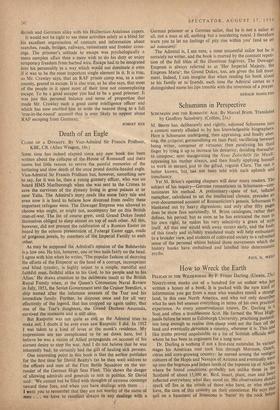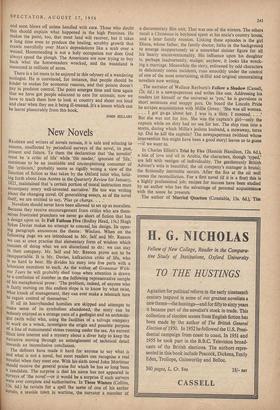How to Wreck the Earth
PELICAN IN THE WILDERNESS. By F. Fraser Darling. (Unwin, 25s.)
NINETY-NINE marks out of a hundred for an author who has, written a honey of a book. It is packed with the rare kind at information you get from a man who wanders round a strange land, in this case North America, and who not only describes what he sees but assesses everything in terms of his own practical experience. As every conservationist knows, Dr. Darling is a Scot and often a troublesome Scot. He farmed the West High" lands before he went to Edinburgh University, practising pastoral' ism long enough to realise that sheep soon eat the face off the, land and eventually devastate a country, wherever it is. This and like truths proved unpalatable to a lot of Scottish officials With whom he has been in argument for a long time. Dr. Darling is nothing if not a first-rate naturalist. In various stages his American tour took him through Mormon, Ozark. citrus and corn-growing country; he moved among the vestigial cultures of the Hopis and Navajos of Arizona and eventually went up into the bogmoss and lichen lands of the topmost tip of Alaska, where he found conditions probably not unlike those in the Scotland of about 15,000 I3C. Bird, insect, plant, man and beast, reflected everywhere what they stood on. His observations should spark off fire in the minds of those who have, or who should have, the care of this country on their conscience. He says that spil on a basement of limestone is 'burnt' by the rock beta/
and soon blows off unless handled with care. Those who doubt this should explain what happened in the high Pennines. He makes the point, too, that most land will recover, but it takes a long time even to produce the healing, scrubby growth that crawls mercifully over Man's depredations like a scab over a wound. Homesteading is not a holy occupation nor does God always speed the plough. The Americans are now trying to buy back what the homesteaders wrecked, and the wasteland is measured in millions of acres.
There is a lot more to be enjoyed in this odyssey of a wandering ecologist. He is convinced, for instance, that people should be kinder to snakes for economic reasons, and that poison doesn't Pay in predator control. The point emerges time and time again that we have got people educated to care for animals; now we have to teach them how to look at country and shout out loud and clear when they see it being ill-treated. It's a lesson which can be learnt pleasurably from this book.
JOHN HILLABY



































 Previous page
Previous page